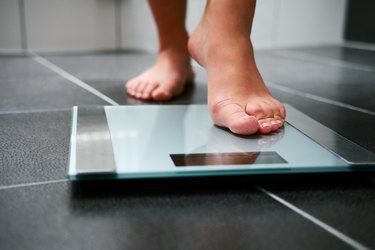
If you go on Amazon or any other consumer shopping website, you'll most likely find hundreds of different direct-to-consumer (DTC) genetic tests that promise to reveal everything from your family heritage to whether or not you have the ability to carry a tune or have a preference for sweet or salty.
These tests are everywhere these days: In fact, the use of DNA testing kits such as AncestryDNA, 23andMe and FamilyTreeDNA has soared over the past decade, and about 100 million people had taken one by the end of 2021, according to the American Medical Association.
Video of the Day
Video of the Day
That's not necessarily a bad thing. "Direct-to-consumer DNA tests empower people to learn more about their genetic predispositions, which is a good thing," says Julia Cooper, LGC, a licensed genetic counselor at The Ohio State University James Comprehensive Cancer Center in Columbus, Ohio.
But they're not quite ready for prime time yet: "They're still very limited in the information they can provide," Cooper says. "They're still more of a novelty than anything." Worth noting: Many at-home tests aren't regulated, which means their health claims aren't verified, per the National Human Genome Research Institute.
With that in mind, here are four things genetic counselors want you to know before you sign up for one.
1. You May End Up With an Unpleasant Surprise
About 20 percent of Americans say they've used a mail-in DNA testing service such as AncestryDNA or 23andMe, according to a 2022 survey from YouGovAmerica. But while you may learn some fun facts — like you're one-eighth Irish or you're likely to be an early riser — you may uncover some more disconcerting information.
About a third of Americans who said either they or someone in their immediate family took a DNA test reported learning about close relatives they had never known about. While that can be a good thing — who doesn't want to meet a long-lost cousin? — some users discovered not-so-pleasant family secrets, such as their cousin was really their half-sister, or that they had four siblings they didn't know existed.
There are even terms for this now, like NPE, or not parent expected, says Brianne Kirkpatrick, LGC, a spokesperson for the National Society of Genetic Counselors and founder of genetic counseling service Watershed DNA. "It can be really traumatic and destabilizing for people, because it shakes your whole sense of personal identity," she says.
On the other hand, you may discover a second cousin who becomes your new best friend, Kirkpatrick points out. So that doesn't mean you need to avoid ancestry tests entirely. Just think carefully about how you'll feel if you come up with an unexpected — and potentially disturbing — result.
2. You Might Misunderstand the Results
Some companies allow you to discover if you've got certain genetic variants associated with all kinds of things, such as the type of ear wax you sport in your ear canals, or whether you have a propensity towards bitter tastes. While these facts are all fun, they're relatively harmless.
What's a little more concerning are tests that purport to check for serious, potentially life-threatening conditions such as breast cancer or kidney disease.
Jessica Everett, LGC, a genetic counselor at New York University Langone Medical Center in New York City, remembers vividly a woman who called her office in a panic a couple years ago and told her she had all three variants of the BRCA genes, which have been linked to a higher risk of both breast and ovarian cancer. "That got my attention, as it's not possible," Everett recalls. It turned out she'd tested negative for all three variants the company screened for but had misread the results.
Even if you read your results correctly, there is the danger you'll be lulled into a false sense of security by them. Some companies, like 23andMe, for example, test for three specific variants of the BRCA genes that are most common among people of Ashkenazi Jewish descent. The company makes clear on its website that it only tests for three out of the more than 1,000 variants.
"While many companies do provide pretest education, unfortunately a lot of people don't pay it enough attention," Everett says. "I've counseled patients who have told me they've had BRCA testing, when it turns out it was just an at-home test for these variants."
If you do get a positive result, follow up with a medical professional. You can start with your primary care provider, who can provide context and refer you to a genetic counselor if necessary. Your doctor or a genetic counselor may wind up recommending you get retested. A December 2018 study in Nature's Genetics in Medicine retested 49 patients who had tested positive for a gene variant on an at-home DNA test. About 40 percent were a false positive, meaning that they actually didn't have the harmful variant.
"This suggests that some DTC labs aren't as accurate as medical-grade genetic testing, which could create serious distress for a patient who thinks they're at increased risk for something when they're truly not," Cooper says.
3. They Are Very Different From What You’d Get in a Doctor’s Office
In general, at-home genetic tests usually only evaluate small regions of each gene, says Cooper, which don't give the full picture.
"It's helpful to think of our genome (all of our DNA) like a set of encyclopedias, with each letter being one nucleotide of DNA, and each sentence being a gene," she says. "If you were to open one volume and go to any random sentence, you would want to look through the entire sentence for mistakes like deletions or duplications of letters, words switched around or a sentence cut short or missing completely."
These kinds of variations are often indicators that you're at increased risk for disease. But at-home DNA testing kits aren't able to give this broader view.
Right now, the most comprehensive genetic testing for things like cancer, cardiovascular diseases and neurological disorders can really only be found in a geneticist's office, Cooper says. "A clinical-grade test looks at the entire sentence as a whole, making sure it is spelled correctly," she says.
At-home DNA kits, on the other hand, only look at very specific parts of any given sentence. "They may only look to see if there is an 'a' where there is supposed to be, but harmful differences can be missed when you are only focusing on a relatively small set of markers," Cooper says.
This can also be confusing for you, the consumer, because advice from the company itself may be based on evidence from just a handful of variants. A February 2020 study in Nutrients, for example, evaluated the online services of 45 companies that offered nutrigenetics, or the study of how a person's genes affects how their body responds to food. Only about a third of the companies even listed which genes or genetic variants they looked at. As a result, it's hard to tell if any of the advice is accurate.
"Unfortunately, right now, all of this is still so in its infancy — there's no way to predict that just because you have a gene variant, you'll be slower to metabolize carbs," Kirkpatrick says.
4. There Are Privacy Concerns
Direct-to-consumer genetic testing companies are collecting more than just your DNA. They have your personal information, including your name, address, email address and possibly facts about your family and your own personal health.
This was made clear a few years ago, when DNA testing service MyHeritage was hacked, and some of the data from more than 92 million users was found on a private server. "You have no idea where your DNA results could end up," points out Kirkpatrick.
That's why it's so important to read all of the forms these companies have on their sites when you enroll, including the permission to share your DNA with third-party research partners. This kind of sharing may sound altruistic, and there are benefits to it, but keep in mind that you can't control what partners do with your information, Cooper says.
- American Medical Association: "Protect sensitive individual data at risk from DTC genetic tests"
- YouGovAmerica: "DNA tests: Many Americans report surprises and new connections"
- Genetics in Medicine: "False-positive results released by direct-to-consumer genetic tests highlight the importance of clinical confirmation testing for appropriate patient care"
- Nutrients: "Direct-to-Consumer Nutrigenetics Testing: An Overview"
- National Human Genome Research Institute: "Regulation of Genetic Tests"
Is this an emergency? If you are experiencing serious medical symptoms, please see the National Library of Medicine’s list of signs you need emergency medical attention or call 911.


